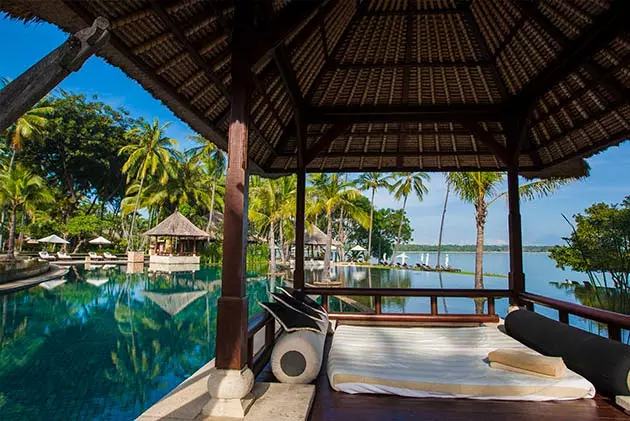
Can you imagine that being here is more worth it than staying on the sofa?
"Us We usually travel a lot. It is common for our friends and acquaintances to ask us how we set it up to be able to lead such a rhythm of life", they comment Ivan Gadea and Nuria Padros , the traveling and thinking minds behind ** Apeadero **. They are the geniuses who have found the equation that we are talking about, which arose "in a conversation in which we tried to explain to some friends, with real numbers, that a trip is sometimes even cheaper than staying at home ".
Iván and Nuria know about this, well They have been touring the five continents for 15 years. This is how Apeadero was born, before "personal travel bicacora" and a year ago, "a reference for solo travelers" . "We realized that, due to our way of traveling, we used to find the best offers, the most extraordinary prices and the cheapest way to move without giving up anything , so we decided to change the orientation of the blog to try to provide travelers with our knowledge in travel hacking", they tell us.
One of the fruits of this new orientation is this formula, which they explain themselves next:
CALCULATE EXPENSES AT HOME AND ON THE TRIP
In order to calculate the point V you must be clear about the expenses involved in staying at home and those involved in traveling. Write down on a piece of paper all the monthly fixed expenses that you will have both in the event that you travel and in the event that you do not: mortgage or rent, electricity or water bills, etc.
Add them up; we will call that figure Minimum Monthly Expenses (GMM) . We will not use these data in the calculation of the V point, but they are very useful to visualize the fixed disbursements that weigh down our vacations, and that would be almost completely eliminated if we carried out a trip without return date or long term.
score now all the expenses you would have if you stayed home in a month (approximately) : going out for lunch or dinner, food, gasoline, movie tickets, etc. We will call that sum Monthly Household Expenses (GHM) .
In the event that you travel, you will need to purchase a flight or other transportation to the destination, and there may be other punctual disbursements for the trip (for example, buying a backpack or insurance) . We will call the sum of these punctual expenses Fixed Travel Expenses (GFV) .
Finally, calculate the average daily cost to travel to the destination what have you decided. take into account your type of vacation and your habits (It is not the same if you usually consume alcohol or if you do not, if you use new ways of traveling such as NightSwapping Or you can't conceive of traveling without a hotel...) . We will call this figure Daily Travel Expense (GVD) .
NOTE: It must be taken into account that the calculation of point V assumes that there is no income. It is a formula created to calculate the balance point in vacation or one-off trips. It is assumed that the traveler does not lose any source of income (employment) nor does he gain one (renting his home, for example) .

Did someone say Iceland? (eyes wide with excitement)
LET'S GO TO THE MESS: CALCULATING POINT V
The difficult part is already done. Now you just have to apply the magic formula to find out After how many days does it pay us more to travel than to stay at home? There is only one thing to keep in mind: **if GHM is less than 30 times the GVD, then we will never break even, (it would pay us to stay in our house)**. For example, if you live in Madrid and want to travel to Iceland, it will probably happen to you. The formula we have to calculate is:
GFV
V = ------------------
GHM - GVD
-------
30
AN EXAMPLE TO GO AROUND THE WORLD
Imagine that the traveler wants to spend a year going around the world.
GMM: Rent (€0) + Electricity (€0) + Water (€0) + Internet (€0) = €0 (As before, this data is not used, but it helps us to see how they disappear when it comes to a long trip because we stopped paying the rent and all the expenses that it entails that would now be Monthly Household Expenses).
GHM: Rent (€340) + Electricity (€60) + Water (€30) + Internet (€36) + Leisure (€200) + Gasoline (€200) + Food (€150) + Others (€100) = €1116
GFV: RTW Flights (€1,450) + Travel Insurance (€450) = €1,900 GVD: €20 ( We increase the average cost because we will probably visit more expensive countries than Indonesia)
Point V remains:
1900
V = ----------------- = 263.8
1116
------- - 30
30
As of day 264 of the trip, it would be compensating us to be away from home! And you, do you dare to calculate Point V on that trip you always dream of but never dare to do?

Saving was never more pleasant...
*** You may also be interested in...**
- Did you just break up? You have to go on a trip!
- 10 reasons why you should take a 'gap year'
- 20 reasons to go around the world
- Reasons why everyone should do a roadtrip at least once in their life
- Tips and tricks to find flights at their best
- Practical tips for traveling in Southeast Asia
- All articles by Marta Sader
